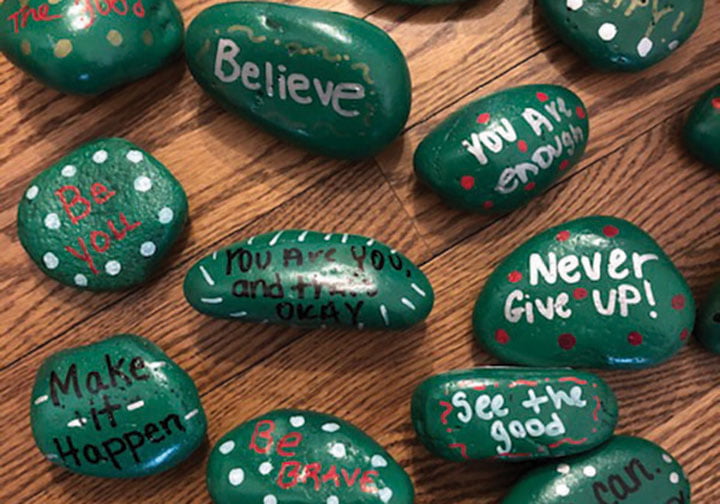
by Katie Peterson
Special to The Leaven
OVERLAND PARK — October 13 has become a difficult day for the Specht family: It is the birthday of their late son Carl, who died by suicide in 2017, following several years of battling mental illness.
But this year, his mom Kelly Specht received an email that she feels was a sign from him.
Since Carl’s death, his family has been active in bringing awareness to the issue of mental health and extinguishing the stigma that surrounds it, establishing a nonprofit called Carl’s Cause in 2018.
At the suggestion of one of Carl’s college friends, one such thing Carl’s Cause has done is paint green rocks — the national color of mental health awareness — with positive messages such as “You are loved” on one side and the nonprofit’s official website on the other. These have now been placed all over the world.
One rock was found by a woman from North Dakota who was playing on a golf course in Minnesota. She planned to die by suicide the following day. But upon seeing the rock and reading Carl’s story, she changed her mind and subsequently sent a grateful email to Kelly — unknowingly on what would have been Carl’s 31st birthday.
“I want to thank you for helping eliminate the stigma of mental illness. I want to tell you thank you for allowing your heartache and loss to save my family from the same fate,” read the email. “I love your Carl. Although I never met him, because of his story, I feel like I knew him, and I most definitely understand him. I know I have a long road ahead of me and there will be two steps forward and three steps back but, nonetheless, your rock put my journey back on the long road instead of it ending at the fork in the road.”

In addition to the rocks, Carl’s Cause has also partnered with the University of Kansas Health System’s Strawberry Hill Campus, which treats individuals with behavioral and psychological health issues. The complex opened in September 2019.
Kelly said that partnership came through yet another coincidence. The Specht family belongs to Holy Spirit Parish in Overland Park, and Carl was a graduate of St. Thomas Aquinas High School in Overland Park. It turned out the wife of one of the chief executive officers of the health system was a teacher at the school.
“There have been so many little, very cool God incidences and things that are coincidences that we feel Carl is up there steering us,” Kelly said. “It is a very clear path because we know what we need to do.”
What they did was create two fundraisers: Strike Out Stigma, a weekend baseball tournament, and a golf tournament.
“Carl was a three-sport athlete . . . and he loved to golf,” Kelly said. “All the things we do we center around fun activities that Carl would enjoy, and other people would enjoy.
“We feel like it appeals to more people to come out and do something that Carl would’ve loved.”
With one baseball tournament in 2019 and three golf tournaments (2018-2020) under their belt, Carl’s Cause has donated more than $200,000 to the Strawberry Hill Campus.
The first $100,000 funded several pieces of exercise equipment, including treadmills, ellipticals and rowing machines.
“Carl believed in exercise and healthy living,” Kelly said. “It’s something that might have made a difference in his life.”
Dr. Gregory Nawalanic, clinical director of psychology services at Strawberry Hill, said exercise is one of the gold standard coping skills taught to behavioral health patients.
“If you’re exercising, you’re able to get that endorphin release, you get a little lift, you feel like you’ve accomplished something and done something that is measurable,” Nawalanic said. “You can say, ‘I did this, I made this investment in myself,’ and we can use that as a bench stone to shape their behavior to remember when they get out.”
The second $100,000 went toward funding a behavioral health care navigator position, which was filled last November. A health care navigator serves to provide patients and families with education and support, and help them navigate through care and financial resources.
“[For] folks that are new to it, it can be very overwhelming,” Nawalanic said. “They’re not really aware of where and how to access these things, how to get it funded and paid for, so the navigator fills that gap.
“The other side of that coin [is] . . . there are a number of patients that are well-known to us and come back regularly,” he said. “In that patient population, the navigator is going to be tasked with . . . trying to identify what is the barrier that is causing the patient to keep falling through the cracks.”
Nawalanic said the clinic is very grateful for the partnership with Carl’s Cause and its effort to raise awareness about mental illness.
“It’s not just about the funds and funding these positions. But as [Carl’s Cause’s] visibility increases in the community, it’s one of those intangible steps towards removing the stigma that’s been such an ever-present barrier to care,” he said. “The more that this story gets normalized and as this spreads and the word gets out . . . there is a comfort level that increases.
“It really can spark a shift to where people are more comfortable acknowledging mental health struggles the same way they would a physical ailment.”
Kelly said Carl’s Cause doesn’t know how to prevent suicide, but they will never stop trying to raise awareness.
“2020 has been a bad year for people. We’ve had so many people reach out to us who have family members struggling, and we want to help anybody we can,” she said. “All of these things have really helped us heal.
“We are very passionate about what we’re doing, and we feel 100 percent that Carl’s guiding us and leading us in what we’re doing.”
For more information, visit the website at: carlscause.org.






